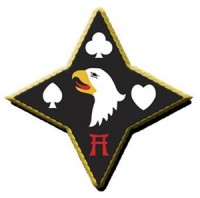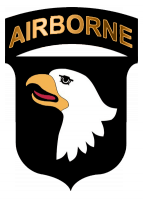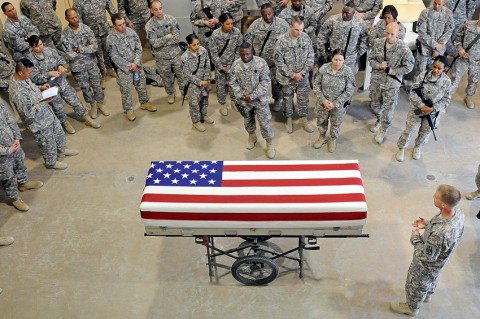Written by Sgt. 1st Class Peter Mayes
101st Sustainment Brigade, 101st Airborne Division (AA) Public Affairs


Bagram Airfield, Afghanistan – The first call came early Saturday morning, August 6th, about the 38 U.S. and Afghan troops, killed by insurgents who shot down their CH-47 Chinook helicopter. After getting the call, Sgt. 1st Class Mary Perez said she doesn’t remember getting much sleep from that moment on.
She, along with other senior leaders from the 101st Sustainment Brigade and the 101st Special Troops Battalion, began rolling up their sleeves and headed to the Bagram Air Field Mortuary Affairs Collection Point where they were tasked to provide support in preparation for the eventual ramp ceremony.

The members of the special operations mission – which included 22 Navy SEALS, three U.S. Air Force airmen, four U.S. Army air crew members and a K-9 unit dog – died after their helicopter was apparently shot down last week as they were flying in to help Army Rangers who were going after insurgents on the ground.
Eight Afghan commandos and an Afghan interpreter were also on board the downed aircraft.
The Department of Defense has ordered an investigation into the incident. According to official reports, the deaths are the highest number of U.S. forces killed during a single event in support of Operation Enduring Freedom.
The Mortuary Affairs Collection Point at Bagram is tasked with the retrieval, tentative identification, transportation and burial of deceased American and allied personnel. The brigade’s special troops battalion provides staff supervision at the site, which is operated by the 54th Quartermaster Company, based out of Fort Lee, VA.
The senior leaders from the brigade and battalion assigned to the detail are not specifically trained as mortuary affairs specialists. They helped with recovering and transporting the remains from the flight line, getting additional transfer cases, ironing the flags, and cleaning the MACP site.
They also took part in the ramp ceremony, acting as pallbearers and carrying the transfer cases of the deceased to the special operations forces units to load onto the planes heading back to the U.S.
“They provided the logistical support we needed, like the vehicles for transport and additional cases as we needed,” said Sgt. 1st Class Alessa Jose, Bagram MACP non-commissioned officer in charge, 54th QM Company “They also made sure we had additional refrigeration units for the fallen.”
Jose said her team normally receives between one and two remains a day to process and handles all aspects of the preparation. She said her team received the remains on Sunday morning, August 7th, and was able to process and prepare all of the remains by Monday, August 8th.
“Their (Lifeliners) support was critical because of the time involved,” she said. “If it was just us doing this, the processing would have taken longer.”
“By the Lifeliners coming in and helping with the other part, it allowed us to focus on the processing job and cut down a lot of the time. You’re looking at about a 36-hour time frame. That helped us out a lot.”
Brigade medical operations officer Maj. Dierdre Lockhart was part of the truck team detail for loading and unloading the deceased SOF team members and said the Lifeliners’ involvement illustrated their willingness to go above and beyond the call of duty.
“It definitely showed we were willing to pick up the ball and run with it when we were needed,” she said.
The brigade conducted Leadership Professional Development training on Mortuary Affairs this past March, where they were introduced to how fallen heroes are identified and processed in preparation to be sent home.
But even attending that training did not prepare the senior leaders for being active participants in an actual event.
Perez said she and other senior leaders in the brigade received a call to go to the MACP, but were unsure what their duty was going to be. As time went on, they started to figure it out, she said.
She and two other officers were also assigned to a truck team that loaded and unloaded the remains. It was the first time she’s ever been involved with something like this, she said.
“You come there to do a mission and then the reality hits you: all you could see, smell and feel was death,” she said. “And you have to maintain composure.”
Perez said she noticed the Navy SEALs carrying their fallen teammates to the trucks. “I mean, these guys are tough, they’re in it, they’re the ones kicking in doors, but I’ve never seen them look more vulnerable,” she said. “They’re not just machines. It brings light to the fact that we’re all in this fight together.”
The decision to use brigade and battalion senior ranking leadership to assist the MACP unit was not lost on Perez, she said.
“You don’t want to expose your junior soldiers to that. It’s emotional and disheartening when you’re in this fight to see mass amounts of casualties like that. There were majors ironing the flags and mopping the floors in the MACP, not because it was a task, but because it was the right thing to do,” she said.
The seniors also intensely rehearsed their part of the ramp ceremony, filling transfer cases with bundles of water and practiced carrying the containers on the K-loaders to deliver to the SOF teams.
“We wanted to do this right and give these guys the honor they earned and deserved,” Perez said. “As an NCO, you know what right looks like. These guys deserve the very best we could give them. Everything had to be perfect.”


